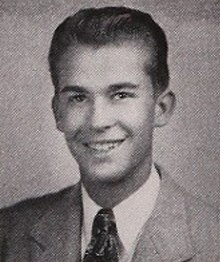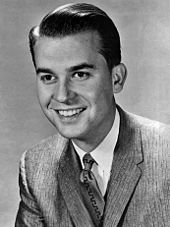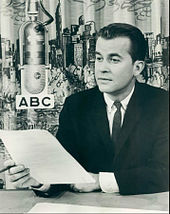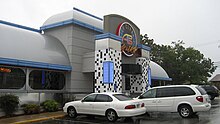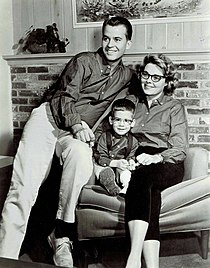Dick Clark
The show gave many new music artists their first exposure to national audiences, including The Supremes, Ike & Tina Turner, Smokey Robinson and the Miracles, Stevie Wonder, Simon & Garfunkel, Iggy Pop, Prince, Talking Heads and Madonna.
[8] In 1945, Clark began his career working in the mailroom at WRUN, an AM radio station in Utica, New York, that was owned by his uncle and managed by his father.
Clark was responsible for a similar program on the company's radio station and served as a regular substitute host when Horn went on vacation.
[7] By the end of year, viewership exceeded 20 million, and featured artists were "virtually guaranteed" large sales boosts after appearing.
[7] In a surprise television tribute to Clark in 1959 on This Is Your Life, host Ralph Edwards called him "America's youngest starmaker", and estimated the show had an audience of 50 million.
A few of the many artists introduced were The Supremes, Ike and Tina Turner, Smokey Robinson and the Miracles, The Beach Boys, Stevie Wonder, Prince, Simon and Garfunkel, Jerry Lee Lewis, Buddy Holly, Bobby Fuller, Johnny Cash, Sam Cooke, Fats Domino and Chubby Checker.
[25]Clark was therefore considered to have a negative influence on youth and was well aware of that impression held by most adults: I was roundly criticized for being in and around rock and roll music at its inception.
[27] Clark noted during the special that American Bandstand was listed in the Guinness Book of Records as "the longest-running variety show in TV history."
[29]As a result of Clark's work on Bandstand, journalist Ann Oldenburg states "he deserves credit for doing something bigger than just putting on a show.
[23] Beginning in 1959 and continuing into the mid-1960s, Clark produced and hosted the Caravan of Stars, a series of concert tours built upon the success of American Bandstand, which by 1959 had a national audience of 20 million.
[17] The reason for Clark's impact on popular culture has been partially explained by Paul Anka, a singer who appeared on the show early in his career: "This was a time when there was no youth culture—he created it.
[32] When asked about some of the causes for the hearings, Clark speculated about some of the contributing factors not mentioned by the press: Politicians ... did their damnedest to respond to the pressures they were getting from parents and publishing companies and people who were being driven out of business [by rock].
In 1999, along with Bob Boden, he was one of the executive producers of Fox's TV game show Greed, which ran from 5 November 1999, to 14 July 2000, and was hosted by Chuck Woolery.
[40] He concluded his game show hosting career with another of his productions, Challenge of the Child Geniuses, a series of two two-hour specials broadcast on Fox in May and November 2000.
Clark aimed to challenge the dominance of Guy Lombardo's New Year's specials on CBS, as he believed its big band music was too dated.
While some TV critics (including Tom Shales of The Washington Post, in an interview with the CBS Radio Network) felt that he was not in good enough shape to do the broadcast, stroke survivors and many of Clark's fans praised him for being a role model for people dealing with post-stroke recovery.
The high point of the show was Clark's unveiling, with great fanfare at the end of each program, of the top ten records of the previous week.
[49] This ritual became so embedded in American culture that it was imitated in many media and contexts, which in turn were satirized nightly by David Letterman on his own Top Ten lists.
A variation of producer Irving Mansfield's earlier CBS series, This Is Show Business (1949–1956), it featured three celebrity panelists, including comedian Jack E. Leonard, judging and offering advice to amateur and semi-professional performers.
Clark appeared in an episode of Police Squad!, in which he asks an underworld contact about ska and obtains skin cream to keep himself looking young.
[51] Despite a feud between Clark and Soul Train creator and host Don Cornelius,[52] the two men later collaborated on several specials featuring black artists.
[50] For a period of several years in the 1980s, Clark simultaneously hosted regular programs on all three major American television networks—ABC (Bandstand), CBS (Pyramid) and NBC (Bloopers).
[citation needed] From 2001 to 2003, Clark was a co-host of The Other Half with Mario Lopez, Danny Bonaduce and Dorian Gregory, a syndicated daytime talk show intended to be the male equivalent of The View.
[50] Clark wrote, produced and starred in the 1968 film Killers Three, a Western drama that served as a promotional vehicle for Bakersfield country musicians Merle Haggard and Bonnie Owens.
Clark also appears in interview segments of a 2002 film, Confessions of a Dangerous Mind, which was based on the "unauthorized autobiography" of Chuck Barris, who had worked at ABC as a standards-and-practices executive during American Bandstand's run on that network.
[62] Though McMahon continued until the company went out of business, Clark's previous involvement in the Payola scandal motivated him to be sensitive about his public image.
In 1965, Clark branched out from hosting, producing Where the Action Is, an afternoon television program shot at different locations every week featuring house band Paul Revere and the Raiders.
Although he was expected to be treated without any serious complications, it was later announced that Clark would be unable to host his annual New Year's Rockin' Eve broadcast, with Regis Philbin filling in for him.
On April 18, 2012, Clark died from a heart attack at a hospital in Santa Monica, California, shortly after undergoing a transurethral resection procedure to treat an enlarged prostate.
[75] President Barack Obama praised Clark's career: "With American Bandstand, he introduced decades' worth of viewers to the music of our times.
